Search Result
Results for "
citric acid cycle
" in MedChemExpress (MCE) Product Catalog:
5
Biochemical Assay Reagents
9
Isotope-Labeled Compounds
| Cat. No. |
Product Name |
Target |
Research Areas |
Chemical Structure |
-
- HY-W009362
-
|
|
Endogenous Metabolite
|
Others
|
|
DL-Isocitric acid trisodium salt is an endogenous metabolite. DL-Isocitric acid trisodium salt is a substrate in the citric acid cycle. DL-Isocitric acid trisodium salt can be used as a marker for determining the composition of isocitrates in fruit products, including fruit juices.
|
-
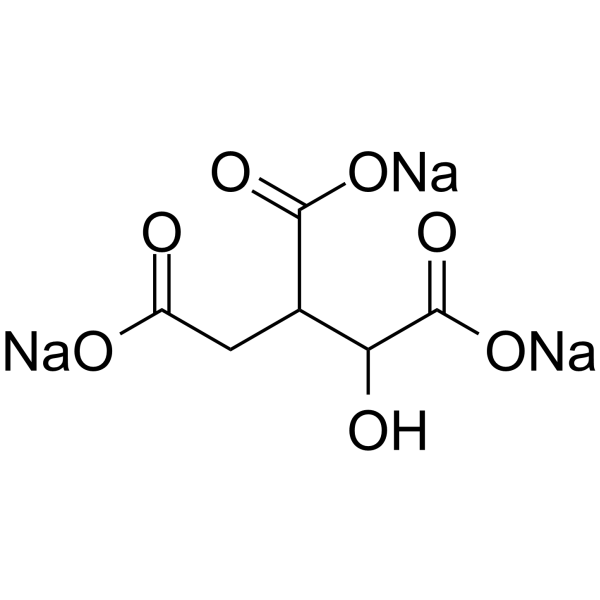
-
- HY-128851
-
|
|
Fatty Acid Synthase (FASN)
Endogenous Metabolite
|
Metabolic Disease
|
|
Coenzyme A (CoASH) is a ubiquitous and essential cofactor, which is an acyl group carrier and carbonyl-activating group for the citric acid cycle and fatty acid metabolism. Coenzyme A plays a central role in the oxidation of pyruvate in the citric acid cycle and the metabolism of carboxylic acids, including short- and long-chain fatty acids .
|
-
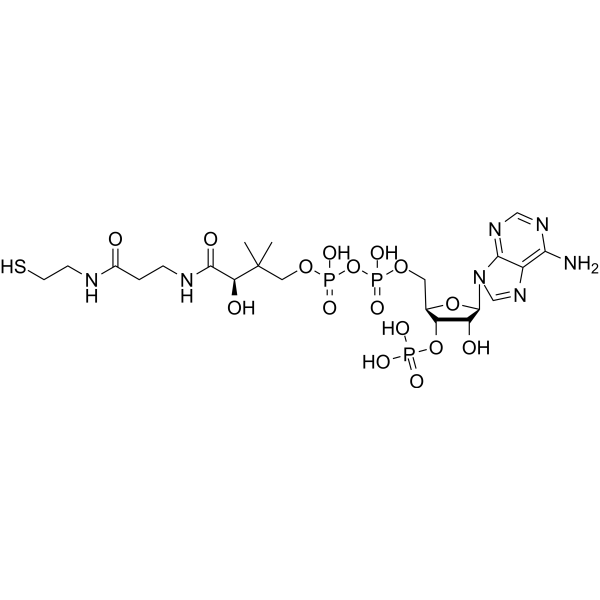
-
- HY-P2993
-
|
ICDH; IDH
|
Isocitrate Dehydrogenase (IDH)
|
Metabolic Disease
|
|
Isocitrate dehydrogenase, Porcine heart (ICDH) is a citric acid or tricarboxylic acid cycle enzyme, is often used in biochemical studies. Isocitrate dehydrogenase catalyzes the oxidative decarboxylation of isocitrate to α-ketoglutarate and reduces NAD(P) + to NAD(P)H, it plays important roles in cellular metabolism .
|
-
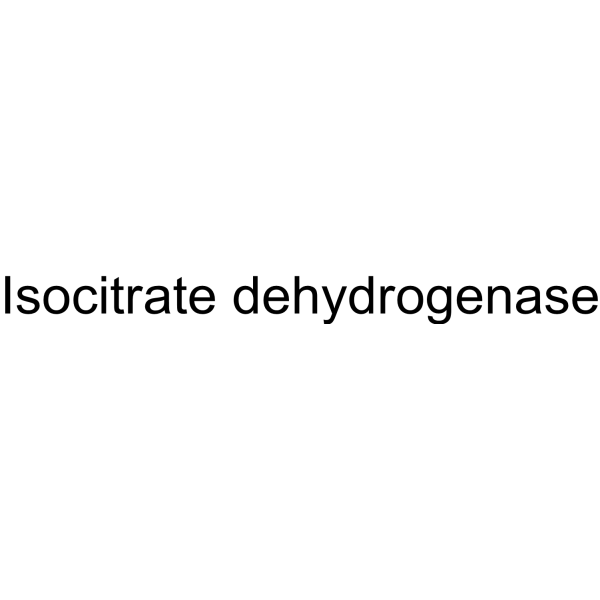
-
- HY-128851A
-
|
|
Endogenous Metabolite
Fatty Acid Synthase (FASN)
|
Metabolic Disease
|
|
Coenzyme A (CoASH) is a ubiquitous and essential cofactor, which is an acyl group carrier and carbonyl-activating group for the citric acid cycle and fatty acid metabolism. Coenzyme A plays a central role in the oxidation of pyruvate in the citric acid cycle and the metabolism of carboxylic acids, including short- and long-chain fatty acids .
|
-
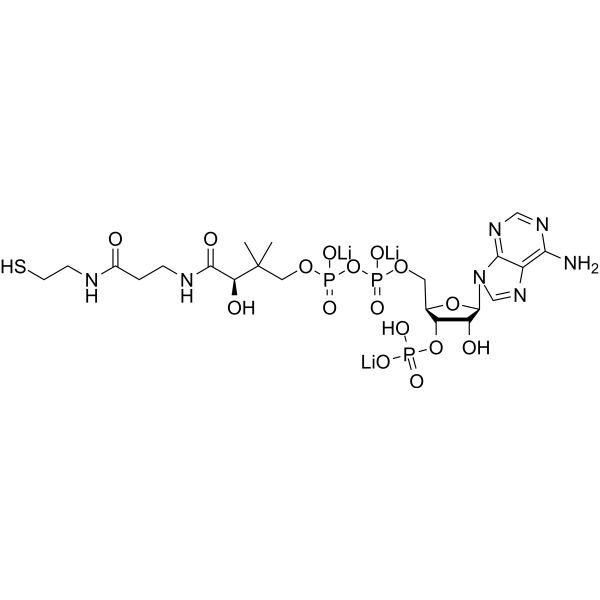
-
- HY-128851B
-
|
|
Endogenous Metabolite
Fatty Acid Synthase (FASN)
|
Metabolic Disease
|
|
Coenzyme A (CoASH) sodium is a ubiquitous and essential cofactor, which is an acyl group carrier and carbonyl-activating group for the citric acid cycle and fatty acid metabolism. Coenzyme A plays a central role in the oxidation of pyruvate in the citric acid cycle and the metabolism of carboxylic acids, including short- and long-chain fatty acids .
|
-
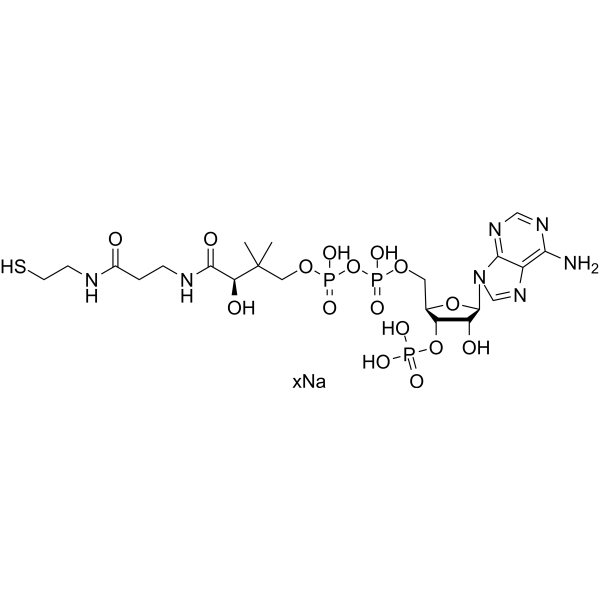
-
- HY-W010382
-
|
2-Oxosuccinic acid
|
Endogenous Metabolite
Reactive Oxygen Species
|
Metabolic Disease
|
|
Oxaloacetic acid (2-Oxosuccinic acid) is a metabolic intermediate involved in several ways, such as citric acid cycle, gluconeogenesis, the urea cycle, the glyoxylate cycle, amino acid synthesis, and fatty acid synthesis, whereby Oxaloacetic acid facilitates the clearance of reactive oxygen species (ROS) and improves mitochondrial function .
|
-
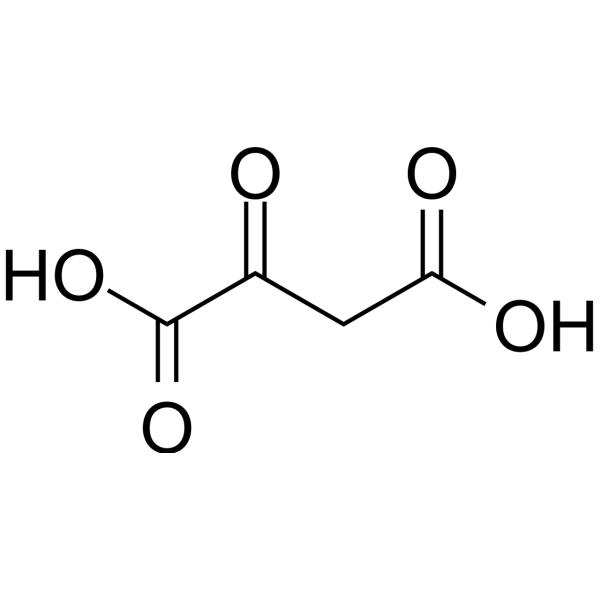
-
- HY-W009362S
-
|
|
Isotope-Labeled Compounds
|
Others
|
|
DL-Isocitric acid- 13C4 (trisodium salt) is a 13C labeled DL-Isocitric acid (trisodium salt) (HY-W009362). DL-Isocitric acid trisodium salt is an endogenous metabolite. DL-Isocitric acid trisodium salt is a substrate in the citric acid cycle. DL-Isocitric acid trisodium salt can be used as a marker for determining the composition of isocitrates in fruit products, including fruit juices.
|
-
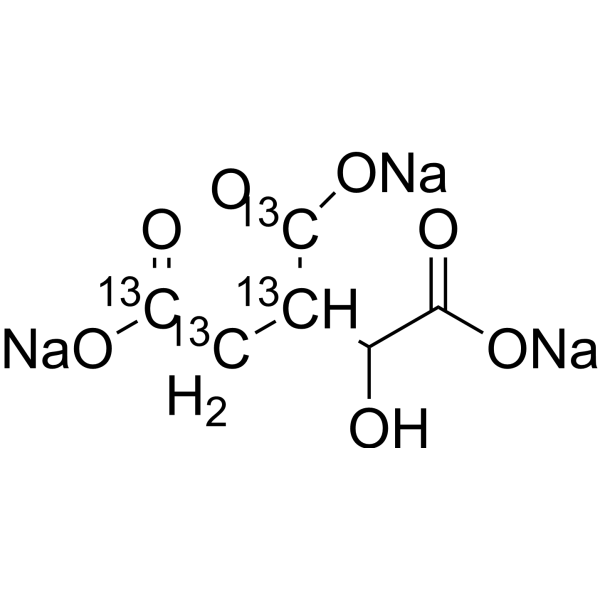
-
- HY-137808
-
|
Succinyl-CoA sodium
|
Endogenous Metabolite
|
Neurological Disease
Metabolic Disease
|
|
Succinyl-Coenzyme A (Succinyl-CoA) sodium is an intermediate of the citric acid cycle. Succinyl-Coenzyme A sodium can be converted to succinic acid and can also combines with glycine to form δ-ALA to synthesize porphyrins (heme). Succinyl-Coenzyme A sodium can be used in the study of metabolic, neurological and haematological abnormalities (such as porphyrias) caused by nutritional vitamin B12 deficiency (resulting in a deficiency in Succinyl-Coenzyme A synthesis) .
|
-
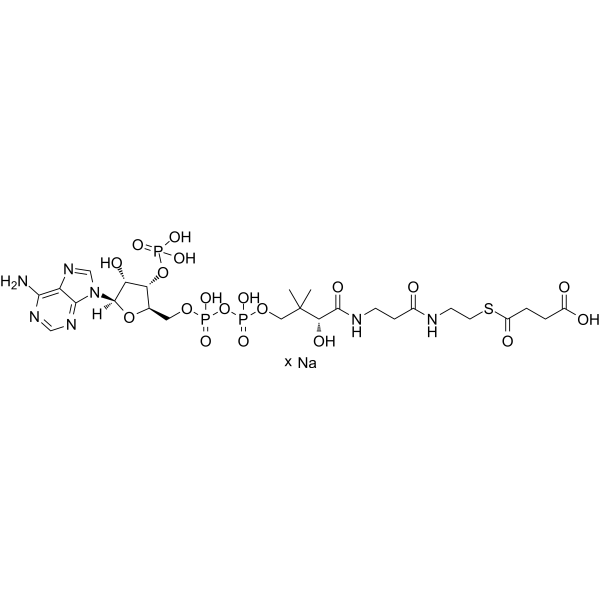
-
- HY-W127841
-
|
|
Biochemical Assay Reagents
|
Others
|
|
Citric acid-2,4-13C2 (Sodium Lauryl Sulfate) is a labeled citric acid. Citric acid is found in many fruits and vegetables, especially citrus fruits. It participates in biological processes in the body, such as the citric acid cycle.
|
-
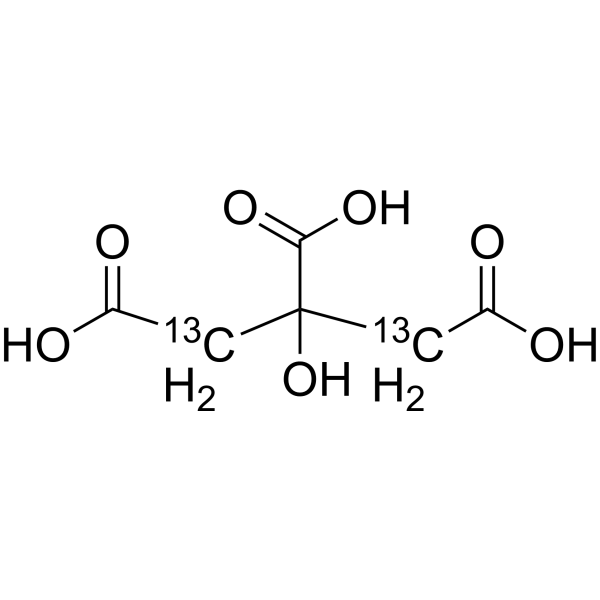
-
- HY-W017524
-
-
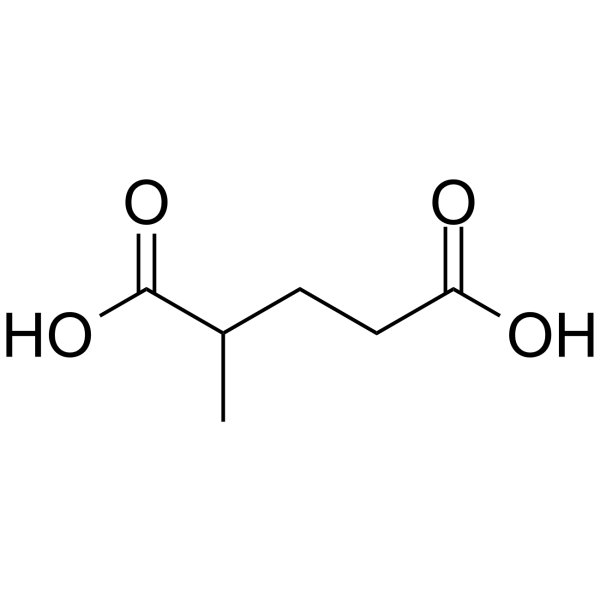
-
- HY-N1428S4
-
|
|
Isotope-Labeled Compounds
Endogenous Metabolite
Apoptosis
Antibiotic
|
Cancer
|
|
Citric acid- 18O is 18O-labeled Citric acid (HY-N1428) Citric acid is a natural preservative and food tartness enhancer. Citric acid induces apoptosis and cell cycle arrest at G2/M phase and S phase in HaCaT cells. Citric acid cause oxidative damage of the liver by means of the decrease of antioxidative enzyme activities. Citric acid causes renal toxicity in mice.
|
-
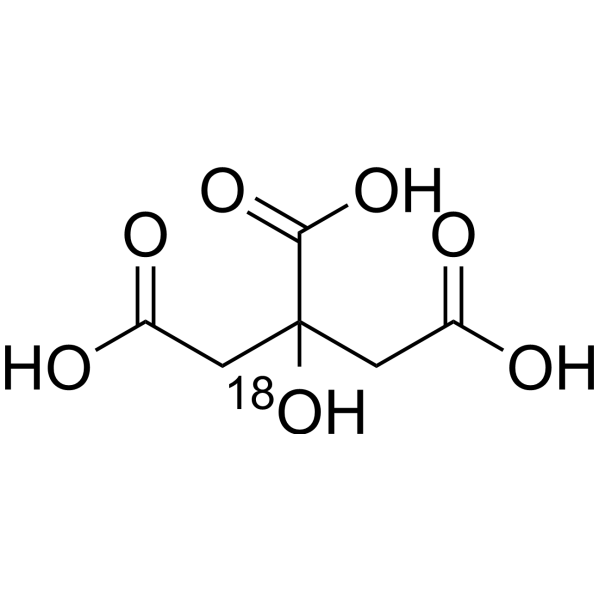
-
- HY-N1428S6
-
|
|
Isotope-Labeled Compounds
Endogenous Metabolite
Apoptosis
Antibiotic
|
Cancer
|
|
Citric acid-d4-1 is deuterated labeled Citric acid (HY-N1428) Citric acid is a natural preservative and food tartness enhancer. Citric acid induces apoptosis and cell cycle arrest at G2/M phase and S phase in HaCaT cells. Citric acid cause oxidative damage of the liver by means of the decrease of antioxidative enzyme activities. Citric acid causes renal toxicity in mice.
|
-
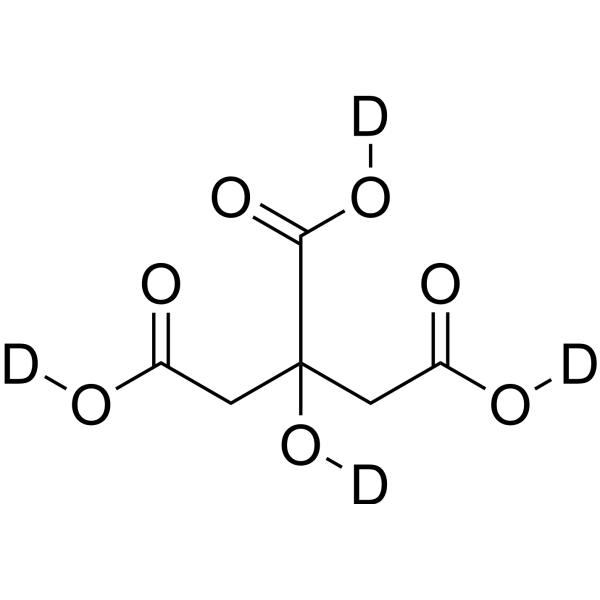
-
- HY-N1428A
-
|
|
|
|
|
Citric acid monohydrate is a natural preservative and food tartness enhancer. Citric acid monohydrate induces apoptosis and cell cycle arrest at G2/M phase and S phase. Citric acid monohydrate cause oxidative damage of the liver by means of the decrease of antioxidative enzyme activities. Citric acid monohydrate causes renal toxicity in mice .
|
-
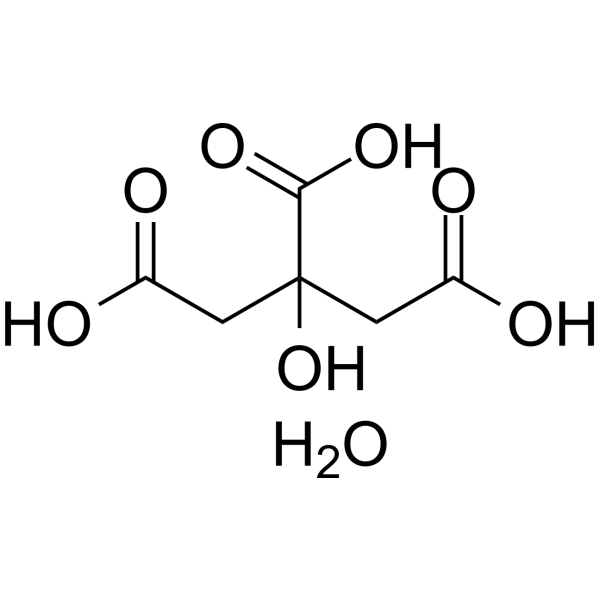
-
- HY-N1428S3
-
|
|
Apoptosis
Endogenous Metabolite
Antibiotic
|
|
|
Citric acid- 13C3 is the 13C labeled Citric acid[1]. Citric acid is a natural preservative and food tartness enhancer. Citric acid induces apoptosis and cell cycle arrest at G2/M phase and S phase in HaCaT cells. Citric acid cause oxidative damage of the liver by means of the decrease of antioxidative enzyme activities. Citric acid causes renal toxicity in mice[2][3][4].
|
-
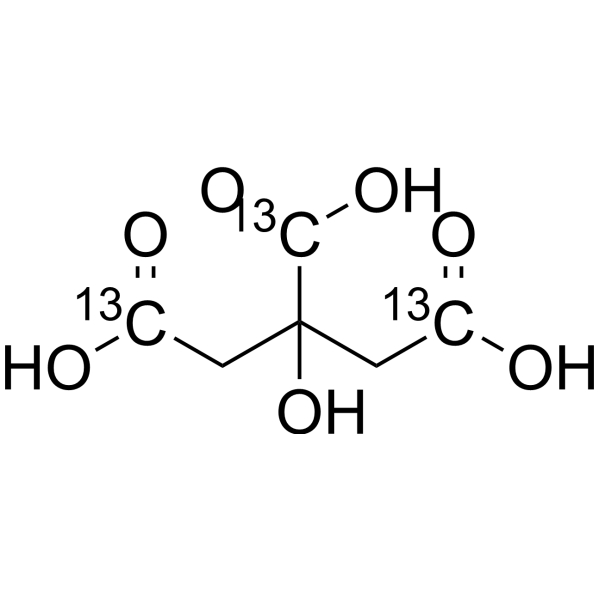
-
- HY-N1428
-
-
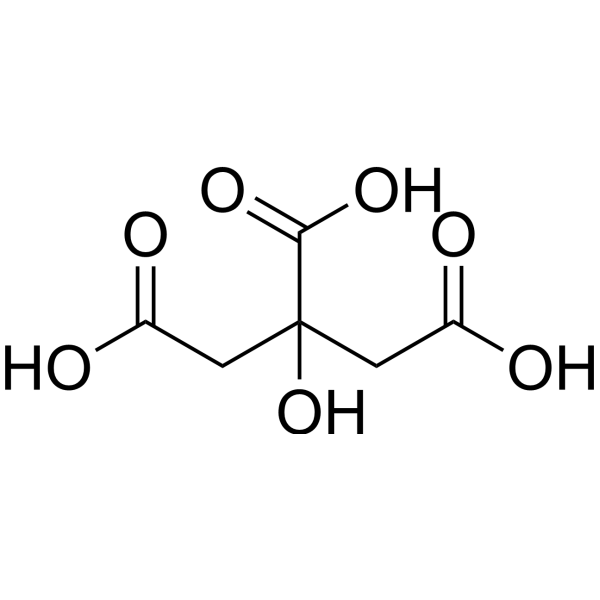
-
- HY-B2201
-
|
Sodium citrate; Trisodium citrate anhydrous
|
Apoptosis
Endogenous Metabolite
|
Metabolic Disease
|
|
Citric acid trisodium is a natural preservative and food tartness enhancer. Citric acid trisodium induces apoptosis and cell cycle arrest at G2/M phase and S phase. Citric acid trisodium cause oxidative damage of the liver by means of the decrease of antioxidative enzyme activities. Citric acid trisodium causes renal toxicity in mice .
|
-
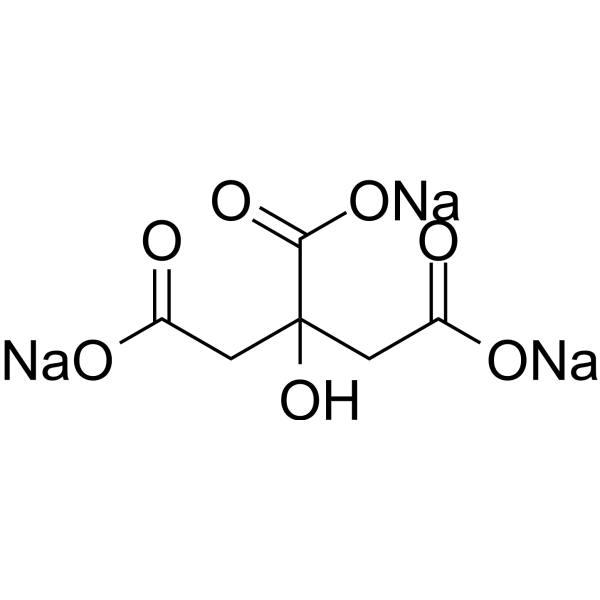
-
- HY-N0273S
-
|
Brassin lactone-d5
|
Isotope-Labeled Compounds
Apoptosis
|
Cancer
|
|
Brassinolide-d5 (Brassin lactone-d5) is the deuterated labeled Brassinolide (HY-N0273). Citric acid is a natural preservative and food tartness enhancer. Citric acid induces apoptosis and cell cycle arrest at G2/M phase and S phase in HaCaT cells. Citric acid cause oxidative damage of the liver by means of the decrease of antioxidative enzyme activities. Citric acid causes renal toxicity in mice .
|
-
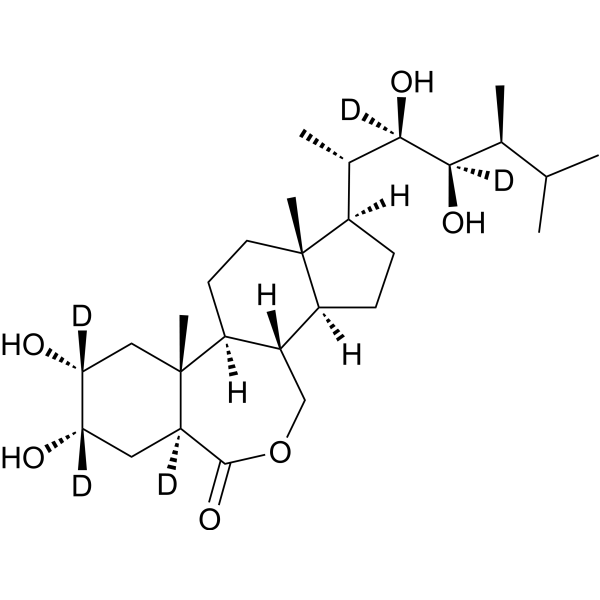
-
- HY-W016814
-
|
cis-Aconitic acid
|
Endogenous Metabolite
|
Others
|
|
(Z)-Aconitic acid (cis-Aconitic acid) is the cis-isomer of Aconitic acid. (Z)-Aconitic acid (cis-Aconitic acid) is an intermediate in the tricarboxylic acid cycle produced by the dehydration of citric acid.
|
-
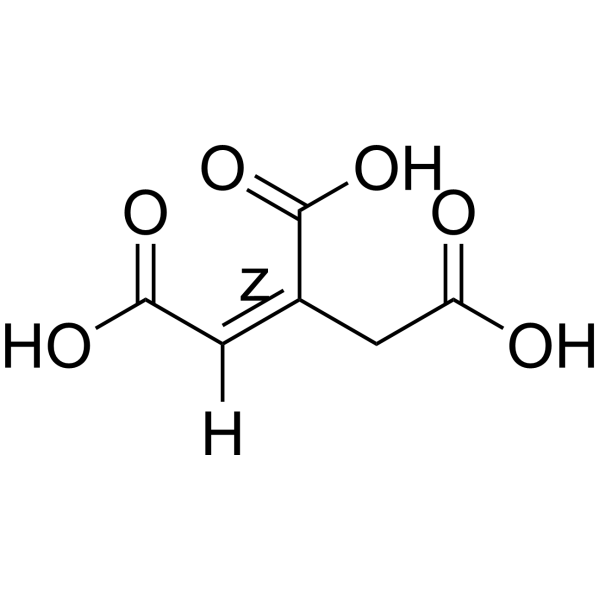
-
- HY-W010382S
-
|
2-Oxosuccinic acid-13C4
|
Endogenous Metabolite
Isotope-Labeled Compounds
|
Metabolic Disease
|
|
Oxaloacetic acid- 13C4 is the 13C-labeled Oxaloacetic acid. Oxaloacetic acid (2-Oxosuccinic acid) is a metabolic intermediate involved in several ways, such as citric acid cycle, gluconeogenesis, the urea cycle, the glyoxylate cycle, amino acid synthesis, and fatty acid synthesis[1][2][3].
|
-
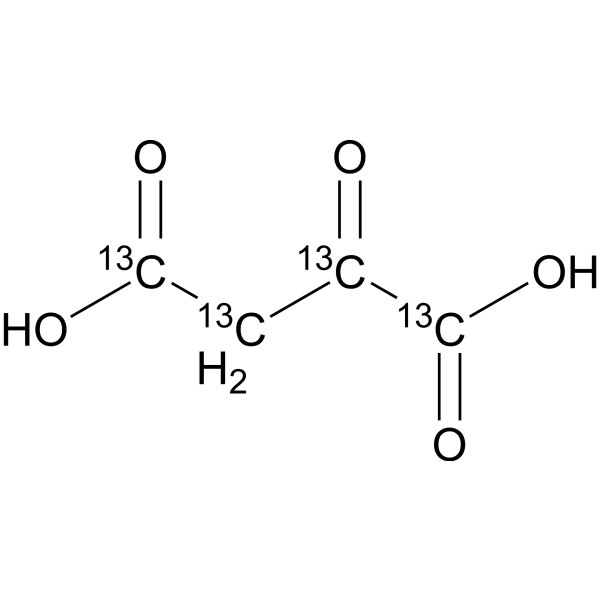
-
- HY-P1032S1
-
|
|
Isotope-Labeled Compounds
Endogenous Metabolite
|
Others
|
|
Angiotensin I- 13C5, 15N (human, mouse, rat) is the 13C and 15N labeled Angiotensin I (human, mouse, rat) (HY-P1032). Citric acid is a natural preservative and food tartness enhancer. Citric acid induces apoptosis and cell cycle arrest at G2/M phase and S phase in HaCaT cells. Citric acid cause oxidative damage of the liver by means of the decrease of antioxidative enzyme activities. Citric acid causes renal toxicity in mice .
|
-
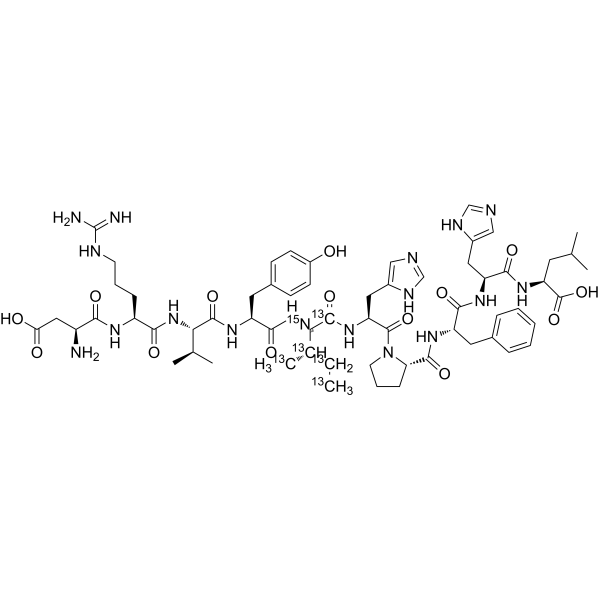
-
- HY-W015883
-
|
|
Endogenous Metabolite
NF-κB
p38 MAPK
|
Metabolic Disease
Inflammation/Immunology
|
|
Fumaric acid is an unsaturated dicarbonic acid, an intermediate product of the citric acid cycle that provides intracellular energy in the form of ATP. Fumaric acid exerts anti-inflammatory effects by inhibiting the NF-κB signaling pathway dependent on p38 MAPK. Fumaric acid can be used in the study of pregnancy-induced hypertension .
|
-
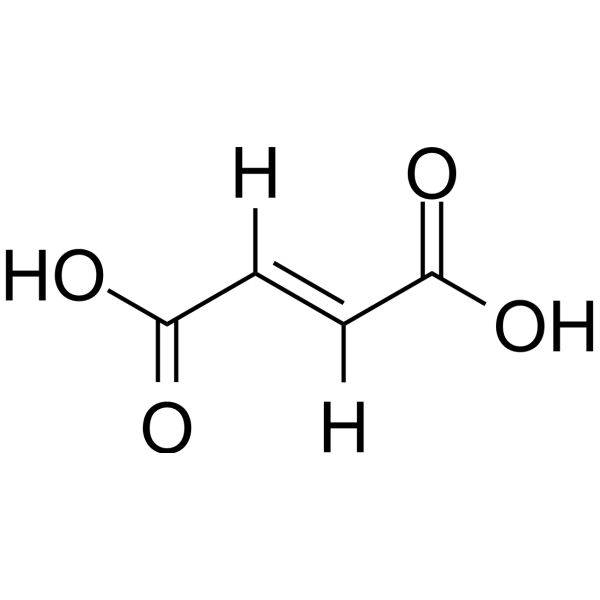
-
- HY-W016814S
-
|
cis-Aconitic acid-13C6
|
Isotope-Labeled Compounds
|
Others
|
|
(Z)-Aconitic acid- 13C6 is the 13C-labeled (Z)-Aconitic acid (HY-W016814). (Z)-Aconitic acid- 13C6 (cis-Aconitic acid) is the cis-isomer of Aconitic acid. (Z)-Aconitic acid- 13C6 (cis-Aconitic acid) is an intermediate in the tricarboxylic acid cycle produced by the dehydration of citric acid.
|
-
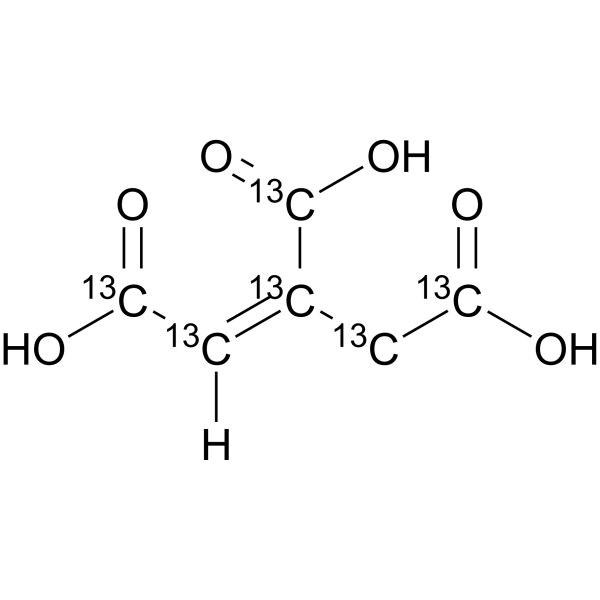
-
- HY-134539
-
IMT1
3 Publications Verification
|
Oxidative Phosphorylation
Mitochondrial Metabolism
DNA/RNA Synthesis
|
Metabolic Disease
Cancer
|
|
IMT1 is a first-in-class specific and noncompetitive human mitochondrial RNA polymerase (POLRMT) inhibitor. IMT1 causes a conformational change of POLRMT, which blocks substrate binding and transcription in a dose-dependent way in vitro. IMT1 reduces deoxynucleoside triphosphate levels and citric acid cycle intermediates, resulting in a marked depletion of cellular amino acid levels. IMT1 has the potential for mitochondrial transcription disorders related diseases .
|
-
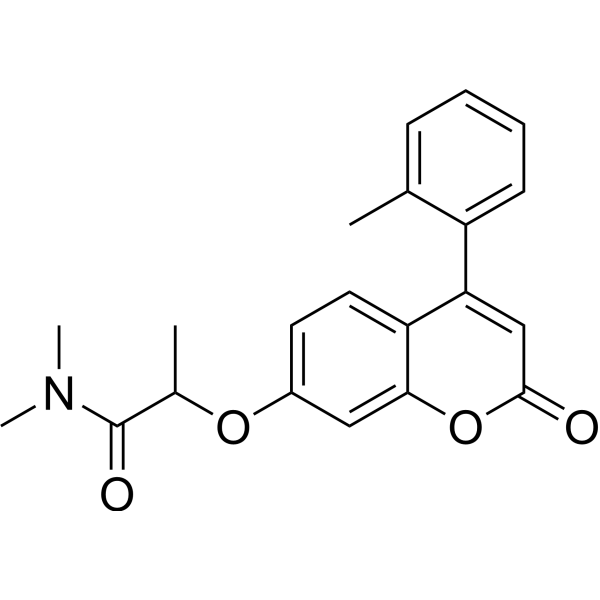
-
-
HY-L148
-
|
|
65 compounds
|
|
The TCA cycle (tricarboxylic acid cycle)—is also known as the Krebs cycle or the citric acid cycle (CAC). The TCA cycle is a series of chemical reactions that release stored energy through the oxidation of acetyl-CoA in carbohydrates, fats, and proteins.
For decades, the TCA cycle has been considered as the central pathway for cell oxidative phosphorylation to produce energy and biosynthesis. Research shows that TCA cycle is associated with many diseases, especially cancer. In colon carcinoma, liver cancer and other cancers, there are mutations that lead to the imbalance of TCA cycle metabolites, indicating that TCA cycle may be related to the occurrence of cancer. Understanding the role and molecular mechanism of TCA cycle in inhibiting or promoting cancer progression will promote the development of new metabolite-based cancer treatment methods in the future.
MCE supplies a unique collection of 65 compounds related to the TCA cycle. MCE TCA Cycle Compound Library is a useful tool for the TCA cycle related research and anti-cancer drug development.
|
| Cat. No. |
Product Name |
Type |
-
- HY-W127841
-
|
|
Biochemical Assay Reagents
|
|
Citric acid-2,4-13C2 (Sodium Lauryl Sulfate) is a labeled citric acid. Citric acid is found in many fruits and vegetables, especially citrus fruits. It participates in biological processes in the body, such as the citric acid cycle.
|
-
- HY-B2201
-
|
Sodium citrate; Trisodium citrate anhydrous
|
Biochemical Assay Reagents
|
|
Citric acid trisodium is a natural preservative and food tartness enhancer. Citric acid trisodium induces apoptosis and cell cycle arrest at G2/M phase and S phase. Citric acid trisodium cause oxidative damage of the liver by means of the decrease of antioxidative enzyme activities. Citric acid trisodium causes renal toxicity in mice .
|
-
- HY-128851A
-
|
|
Biochemical Assay Reagents
|
|
Coenzyme A (CoASH) is a ubiquitous and essential cofactor, which is an acyl group carrier and carbonyl-activating group for the citric acid cycle and fatty acid metabolism. Coenzyme A plays a central role in the oxidation of pyruvate in the citric acid cycle and the metabolism of carboxylic acids, including short- and long-chain fatty acids .
|
-
- HY-128851B
-
|
|
Biochemical Assay Reagents
|
|
Coenzyme A (CoASH) sodium is a ubiquitous and essential cofactor, which is an acyl group carrier and carbonyl-activating group for the citric acid cycle and fatty acid metabolism. Coenzyme A plays a central role in the oxidation of pyruvate in the citric acid cycle and the metabolism of carboxylic acids, including short- and long-chain fatty acids .
|
-
- HY-P2739
-
|
|
Biochemical Assay Reagents
|
|
Citrate synthase is responsible for catalyzing the first reaction of the citric acid cycle: the condensation of acetyl-CoA and oxaloacetate to form citrate. Citrate synthase is localized within eukaryotic cells in the mitochondrial matrix .
|
| Cat. No. |
Product Name |
Target |
Research Area |
-
- HY-P1032S1
-
|
|
Isotope-Labeled Compounds
Endogenous Metabolite
|
Others
|
|
Angiotensin I- 13C5, 15N (human, mouse, rat) is the 13C and 15N labeled Angiotensin I (human, mouse, rat) (HY-P1032). Citric acid is a natural preservative and food tartness enhancer. Citric acid induces apoptosis and cell cycle arrest at G2/M phase and S phase in HaCaT cells. Citric acid cause oxidative damage of the liver by means of the decrease of antioxidative enzyme activities. Citric acid causes renal toxicity in mice .
|
-
- HY-P2739
-
|
|
Peptides
|
Others
|
|
Citrate synthase is responsible for catalyzing the first reaction of the citric acid cycle: the condensation of acetyl-CoA and oxaloacetate to form citrate. Citrate synthase is localized within eukaryotic cells in the mitochondrial matrix .
|
| Cat. No. |
Product Name |
Category |
Target |
Chemical Structure |
| Cat. No. |
Product Name |
Chemical Structure |
-
- HY-W127841
-
|
|
|
Citric acid-2,4-13C2 (Sodium Lauryl Sulfate) is a labeled citric acid. Citric acid is found in many fruits and vegetables, especially citrus fruits. It participates in biological processes in the body, such as the citric acid cycle.
|
-

-
- HY-W009362S
-
|
|
|
DL-Isocitric acid- 13C4 (trisodium salt) is a 13C labeled DL-Isocitric acid (trisodium salt) (HY-W009362). DL-Isocitric acid trisodium salt is an endogenous metabolite. DL-Isocitric acid trisodium salt is a substrate in the citric acid cycle. DL-Isocitric acid trisodium salt can be used as a marker for determining the composition of isocitrates in fruit products, including fruit juices.
|
-

-
- HY-N1428S4
-
|
|
|
Citric acid- 18O is 18O-labeled Citric acid (HY-N1428) Citric acid is a natural preservative and food tartness enhancer. Citric acid induces apoptosis and cell cycle arrest at G2/M phase and S phase in HaCaT cells. Citric acid cause oxidative damage of the liver by means of the decrease of antioxidative enzyme activities. Citric acid causes renal toxicity in mice.
|
-

-
- HY-N1428S6
-
|
|
|
Citric acid-d4-1 is deuterated labeled Citric acid (HY-N1428) Citric acid is a natural preservative and food tartness enhancer. Citric acid induces apoptosis and cell cycle arrest at G2/M phase and S phase in HaCaT cells. Citric acid cause oxidative damage of the liver by means of the decrease of antioxidative enzyme activities. Citric acid causes renal toxicity in mice.
|
-

-
- HY-N1428S3
-
|
|
|
Citric acid- 13C3 is the 13C labeled Citric acid[1]. Citric acid is a natural preservative and food tartness enhancer. Citric acid induces apoptosis and cell cycle arrest at G2/M phase and S phase in HaCaT cells. Citric acid cause oxidative damage of the liver by means of the decrease of antioxidative enzyme activities. Citric acid causes renal toxicity in mice[2][3][4].
|
-

-
- HY-N0273S
-
|
|
|
Brassinolide-d5 (Brassin lactone-d5) is the deuterated labeled Brassinolide (HY-N0273). Citric acid is a natural preservative and food tartness enhancer. Citric acid induces apoptosis and cell cycle arrest at G2/M phase and S phase in HaCaT cells. Citric acid cause oxidative damage of the liver by means of the decrease of antioxidative enzyme activities. Citric acid causes renal toxicity in mice .
|
-

-
- HY-W010382S
-
|
|
|
Oxaloacetic acid- 13C4 is the 13C-labeled Oxaloacetic acid. Oxaloacetic acid (2-Oxosuccinic acid) is a metabolic intermediate involved in several ways, such as citric acid cycle, gluconeogenesis, the urea cycle, the glyoxylate cycle, amino acid synthesis, and fatty acid synthesis[1][2][3].
|
-

-
- HY-P1032S1
-
|
|
|
Angiotensin I- 13C5, 15N (human, mouse, rat) is the 13C and 15N labeled Angiotensin I (human, mouse, rat) (HY-P1032). Citric acid is a natural preservative and food tartness enhancer. Citric acid induces apoptosis and cell cycle arrest at G2/M phase and S phase in HaCaT cells. Citric acid cause oxidative damage of the liver by means of the decrease of antioxidative enzyme activities. Citric acid causes renal toxicity in mice .
|
-

-
- HY-W016814S
-
|
|
|
(Z)-Aconitic acid- 13C6 is the 13C-labeled (Z)-Aconitic acid (HY-W016814). (Z)-Aconitic acid- 13C6 (cis-Aconitic acid) is the cis-isomer of Aconitic acid. (Z)-Aconitic acid- 13C6 (cis-Aconitic acid) is an intermediate in the tricarboxylic acid cycle produced by the dehydration of citric acid.
|
-

Your information is safe with us. * Required Fields.
Inquiry Information
- Product Name:
- Cat. No.:
- Quantity:
- MCE Japan Authorized Agent:































